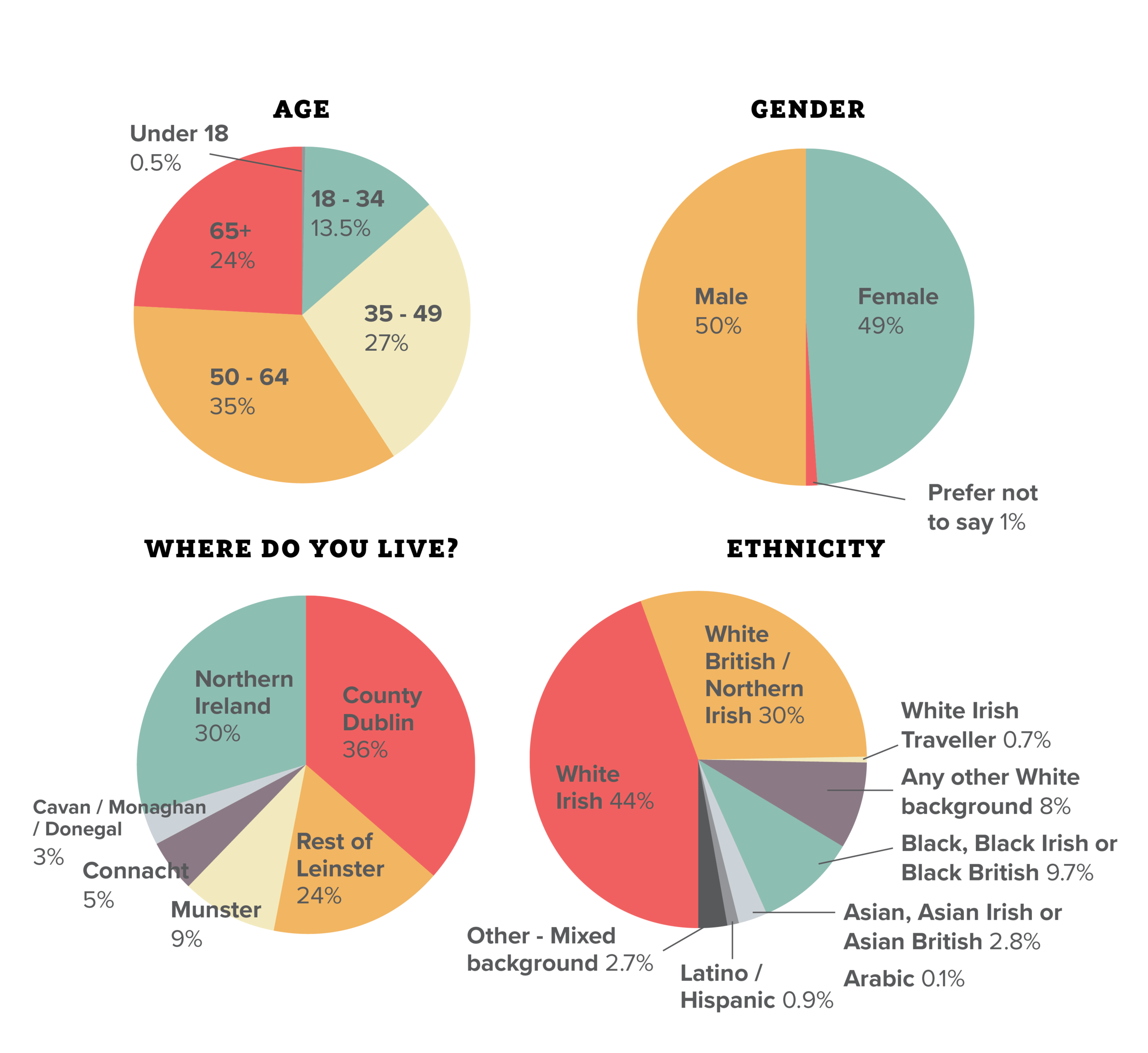Survey: Exploring Race and the Churches in Ireland
By Ruth Garvey-Williams (VOX) and Damian Jackson (IICM)
(From the October - December 2021 issue of VOX)
After this I looked, and there before me was a great multitude that no one could count, from every nation, tribe, people and language, standing before the throne and before the Lamb. They were wearing white robes and were holding palm branches in their hands. And they cried out in a loud voice: “Salvation belongs to our God, who sits on the throne, and to the Lamb.” Revelation 7: 9 - 10
At VOX magazine, we’ve always been passionate about giving voice to Christians in Ireland. That has often involved carrying out high-quality and wide-ranging independent research on matters relating to the Church. Our latest study was the most comprehensive we’ve embarked on to date. We wanted to deepen our understanding of the experience of and attitudes towards racism and discrimination in churches in Ireland and Northern Ireland. We also look positively at the potential for unity, integration and inclusion and examine how the church can lead the way in tackling racial injustice.
The research was conducted as a partnership with the Irish Interchurch Meeting (representing Catholic, Church of Ireland, Presbyterian, Methodist, Redeemed Christian Church of God, Orthodox and Quaker churches) and with active support from the Evangelical Alliance of Ireland, Evangelical Alliance Northern Ireland and Tearfund Ireland. Our online survey ran in July and August 2021 and collected over 1,000 responses.
Headline Findings
“There is overwhelming support amongst committed members of Irish and Northern Irish churches for intentional engagement in conversations and dialogue about race and inclusion in our churches.”
While we will unpack the findings in greater detail through this edition of VOX magazine (as well as in a more comprehensive report due out in November) in this introduction, we share some of the big picture findings.
The first key message is that there is overwhelming support amongst committed members of Irish and Northern Irish churches for intentional engagement in conversations and dialogue about race and inclusion in our churches. The survey received 1059 responses, and 89% described themselves as committed Christians, with 63% “active and fully using my gifts” and 22% “active but not fully using my gifts” so these are highly engaged and committed people within the churches.
That is why it’s extremely significant that 90% of respondents think it is important for churches in Ireland / Northern Ireland to engage in conversations about race and racism and 82% strongly agree or agree that “Racism and discrimination are real problems in Ireland / Northern Ireland”.
Experiences
“Positive comments point to multi-cultural churches as a shining example of unity in Christ overcoming differences between ethnicities.”
An important focus of the research was on listening well to the experiences of ethnic minorities within our churches and these are unpacked more fully on page 22. While a majority of Christians from ethnic minority backgrounds say they have not experienced racism (77.7%) or discrimination (64.5%) in churches, the reality of racism, discrimination, micro-aggressions and inappropriate jokes that are happening regularly or occasionally is a major concern. Stories and examples reveal a range of painful and difficult experiences.
A significant number of respondents who attend a church that reflects their own ethnicity say they have not experienced racism, with examples including Redeemed Christian Church of God, the Traveller Church in Dublin and the Chinese Church. Other positive comments point to multi-cultural churches as a shining example of unity in Christ overcoming differences between ethnicities.
Attitudes
The survey explored the attitude of the white majority populations of Ireland and Northern Ireland to issues around racism and inclusion and these are unpacked more fully on page 34.
Perhaps surprisingly, 67% of all respondents strongly agree or agree that, “White privilege makes life so much easier for white people in Ireland” and that therefore life is harder if you are not white. This is surprising because there is a common misconception that white privilege can’t be real because many white people have lives that are far from privileged (an opinion that was reflected in some comments). The term “white privilege” simply means that if you are white, your skin colour does not contribute to your disadvantage. It seems that most respondents had a clear understanding of this distinction.
A significant majority indicated that they value diversity as a gift in their church, and that people from ethnic minorities should be included fully in church life:
● 93% of all respondents strongly agree or agree that churches are enriched by ethnic diversity
● 79% of the majority ethnic community strongly agree or agree that, “members from ethnic minorities add vibrancy to the worship in my church.”
● 81% of people from the ethnic majority strongly agree or agree that “the leadership of a church should reflect the ethnic diversity of its congregation.”
These findings are illuminated in hundreds of thoughtful comments, examples and suggestions.
A minority of respondents expressed strong disagreement to some of the concepts explored in the survey. This is particularly the case when the systemic and structural nature of racism is articulated, rather than focussing on overt racist incidents by individuals.
60 people (7%) strongly disagree or disagree that “Racism and discrimination are real problems in Ireland / Northern Ireland”. 17% of all respondents and over 20% of Northern Irish respondents disagree or strongly disagree with the statement “White privilege makes life so much easier for white people in Ireland.” And 31% of people from the majority ethnic community (white Irish or Northern Irish) strongly agree or agree with the statement “the Black Lives Matter movement has gone too far” with many pointing to the BLM organisation in America as reason for shunning the movement as a whole.
While these opinions are in the minority they are nonetheless vocal. In the survey we gave ample opportunity for people to expand in comments on their thoughts and two concepts, in particular - white privilege and Black Lives Matter - stimulated a strong and assertive (sometimes aggressive) backlash.
Respondents made accusations that the survey itself was biased, intent on stirring division, promoting critical race theory, “culturally Marxist” and other tropes reflective of social media discourse from the United States.
The key learning is that when church leaders address racism, they will likely experience pushback and aggressive opposition. However, this comes from a small vocal minority, as the empirical data demonstrates.
Church leaders should be encouraged that most people are (probably silently) supportive, and recognise that churches must act to address racial discrimination and injustice within and outside their own communities. Respondents don’t want (fear of) this vocal and assertive backlash to stifle necessary and loving self-examination, seeking to make our churches places of inclusion for all.
It is interesting therefore that there is an apparent lack of confidence amongst church leaders in the support for having these conversations and for working to make churches places of inclusion for all ethnicities. This is perhaps understandable given the opposition that is often forcefully voiced by the minority.
While only 3% of clergy said that race and ethnicity are “taboo” subjects in their churches, 55% said they are not taboo but “we don’t talk about it much.”
There is still much work to do to progress from welcome to inclusion but we can be encouraged that, despite vocal objections from a small minority, the overwhelming majority of committed Christians are supportive of this work and recognise it as part of our responsibility as Christians to foster and model a counter-cultural community of grace in which all can flourish.


